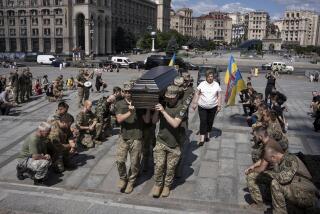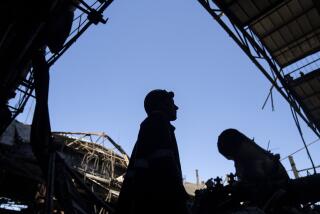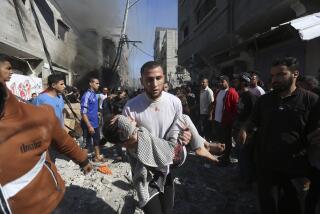Ethnic Albanians, Serbs Work Together in Power Struggle
- Share via
UROSEVAC, Yugoslavia — Wars aren’t fought with guns and bombs alone, and in Kosovo, teams of Serbs and ethnic Albanians are defending the province against NATO with ratchet wrenches and lengths of cable.
They are linemen working for the state electric utility, Elektrokosmet, and each day they wage their own battles against the damage that allied pilots, with their relentless bombing, are doing to this country’s power grid, trying to make it collapse.
It’s a crime under the laws of war to attack civilian infrastructure such as bridges, water pumping plants, fuel storage sites and power supplies beyond what is necessary to cripple a country’s armed forces. And NATO insists that its continuing airstrikes against Yugoslavia’s infrastructure are aimed only at the military.
But after 67 days of airstrikes, just flipping a switch and seeing a light go on can be cause for celebration.
The Kosovo Albanians and Serbs working together to repair severed cables, often under bombardment, aren’t likely to get medals. To the doctors, bakers and everyone else depending on them here, however, they are heroes just the same.
“Each time we repair a problem, it’s a victory that boosts our morale,” Serbian lineman Nenad Milosevic, 31, said Saturday in this Kosovo city about 30 miles south of the provincial capital, Pristina.
Linemen who work on the high towers that form the backbone of Yugoslavia’s crippled power grid are under orders to tie themselves to the damaged structures in case NATO warplanes return for another strike.
“That way, if there’s an explosion and the shrapnel wounds them, they won’t fall off and get killed,” said Bozidar Kovacevic, Elektrokosmet’s director of power grid maintenance.
Kovacevic believes he is alive today only because he was an hour late for a job Tuesday.
He and his eight crew members were supposed to repair a section of the grid on a hill between the towns of Decani and Djakovica, near Kosovo’s western border with Albania, at 11 a.m. They didn’t get there until noon.
“At 11 a.m., NATO bombed the particular tower which we were supposed to fix,” Kovacevic said. “After that event, we went straight to the Pec patriarchy to light a candle [in prayer].”
Of about 60 linemen working for Elektrokosmet in Urosevac, roughly half are Serbs and the other half ethnic Albanians, according to Slobodan Miletic, the firm’s local financial director.
“Everybody works, of course, because Albanians need electricity too,” Kovacevic said.
Dalib Recica is among several thousand ethnic Albanians who stayed in Urosevac after most left to escape Serbian attacks, NATO bombardment and a renewed civil war between security forces and separatist guerrillas.
On a rainy day recently, Recica struggled with about a dozen other ethnic Albanian and Serbian linemen to piece together a downed cable that was blown apart in a NATO cluster bomb attack.
The cluster bomb apparently was aimed at the pipe factory across the street. When it opened in midair, about 200 smaller bombs dropped out and hit the road and a dozen ethnic Albanian houses.
Recica and the rest of the crew had the power cable back up in less than an hour, which was somewhat of a shock to spectators in a country where people aren’t used to seeing state employees work so hard.
“Of course Serbs and Albanians are working together to fix things,” Recica said Saturday from behind an Elektrokosmet bill payment counter, where he doubles as a clerk. “It’s for the good of all of us.”
That may sound like a line from a war propaganda poster, but there wasn’t a police officer or soldier anywhere nearby, or anything else to suggest that Recica was being forced to work in some kind of chain gang.
Recica was reluctant to say much because, like many ethnic Albanians still working for the state in Kosovo, he fears being branded a collaborator and punished by separatist Kosovo Liberation Army guerrillas.
An estimated 600,000 ethnic Albanians are still living in Kosovo, but the number drops almost by the hour as refugees continue to flee into neighboring Albania and Macedonia.
While some ethnic Albanians reportedly are hiding in forests and mountains without food or shelter, Serbian police are allowing many others to return to towns and cities.
Yet NATO’s airstrikes, which are intended to give lasting peace and security to Kosovo’s ethnic Albanian majority, are making life difficult for those still trying to survive here.
NATO warplanes almost flattened the main water filtration plant that feeds Pristina, but repair crews managed to get the supply flowing again after a couple of days.
But when NATO bombs knock out the power supply again, as they do almost every day, the pumps go down again and people wait to see how long it takes the emergency crews to work yet another miracle.
Pristina’s hospital, which treats war casualties from all of Kosovo’s ethnic groups, routinely loses normal power for three and four hours at a stretch--even 10 hours on the worst day, director Dr. Rade Grbic said Saturday.
The hospital has four large generators that suck up about a ton of fuel in five hours, Grbic said.
Since NATO has destroyed most of Yugoslavia’s fuel depots and refineries, and the generators also need frequent maintenance and fresh parts, it’s getting harder to count on emergency power, the surgeon added.
“As a result, we might come to a point when the generators will not work and the lives of the patients on life-support machines, the lives of babies in incubators and the lives of those patients who need operations will all be endangered,” Grbic said.
*
All of Watson’s dispatches from Kosovo are available on The Times’ Web site at https://fold6.site/dispatch.
More to Read
Sign up for Essential California
The most important California stories and recommendations in your inbox every morning.
You may occasionally receive promotional content from the Los Angeles Times.










